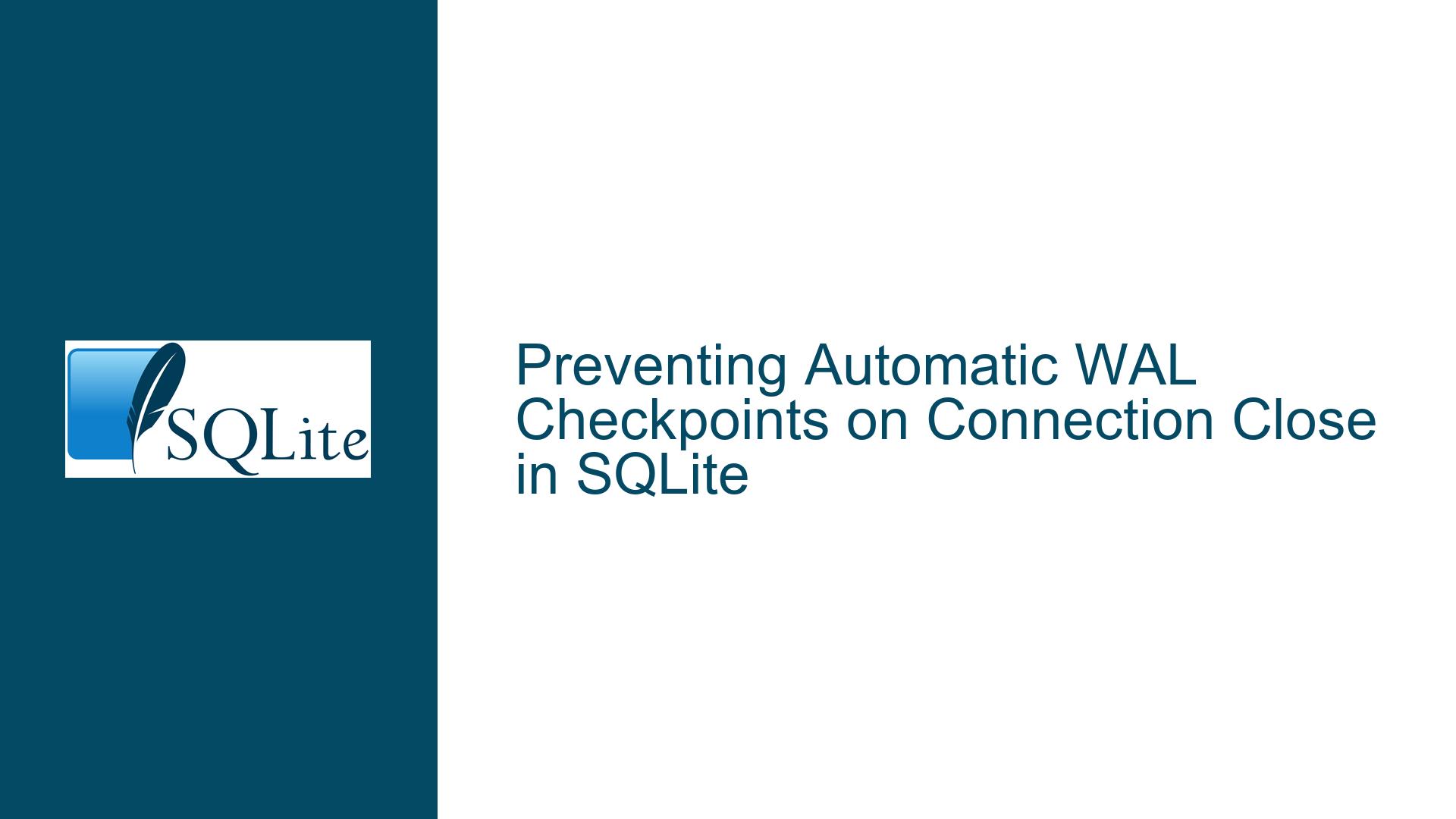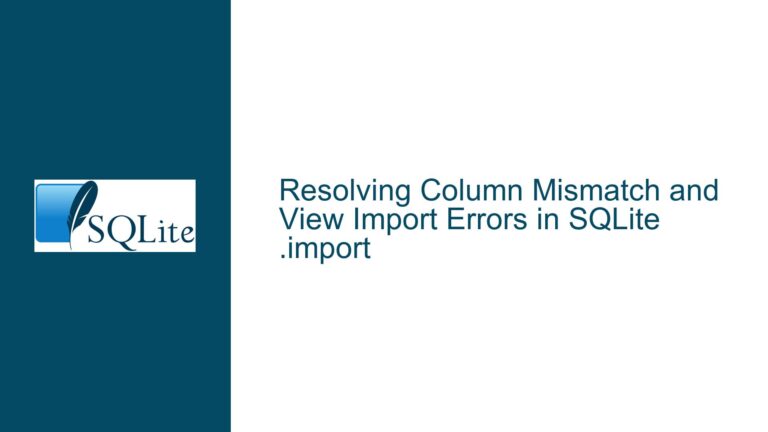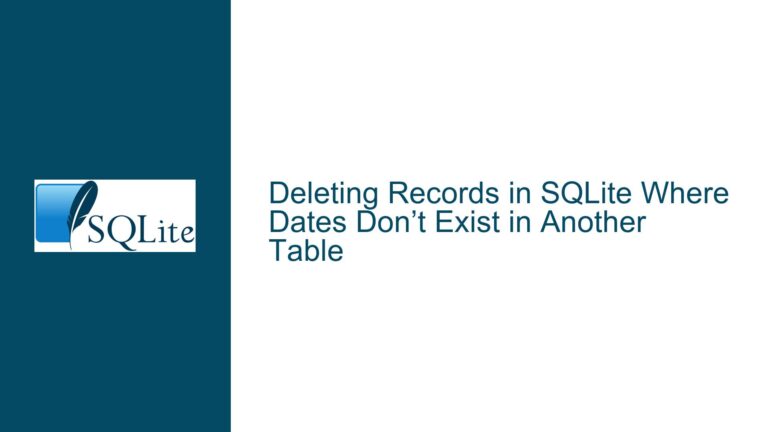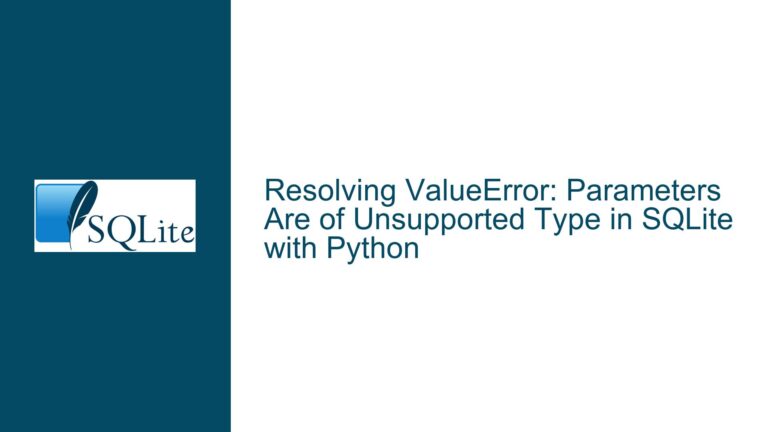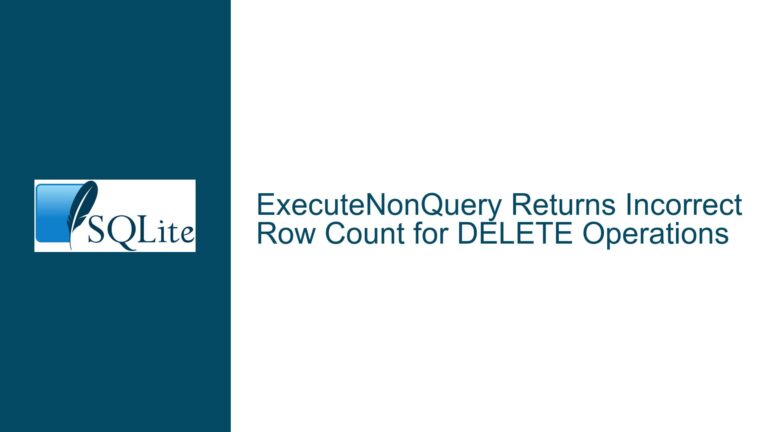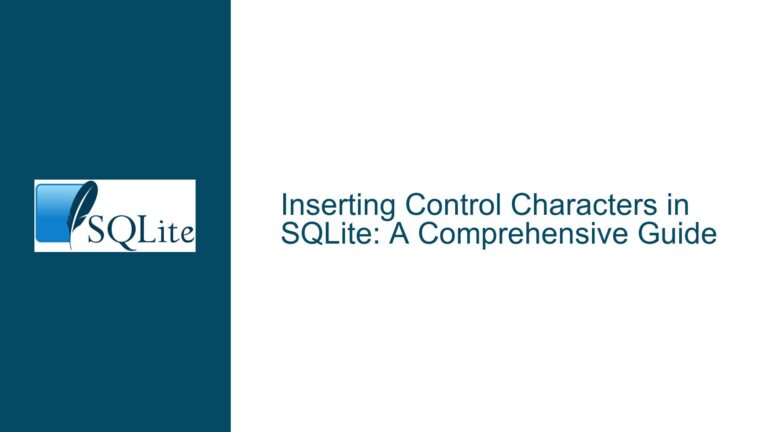Preventing Automatic WAL Checkpoints on Connection Close in SQLite
Understanding WAL Checkpoint Behavior and Disabling Final Checkpoint on Connection Closure
The Write-Ahead Log (WAL) mechanism in SQLite provides significant performance advantages by decoupling write operations from read operations. However, controlling checkpoint behavior—particularly suppressing automatic checkpoints when the last database connection closes—requires a nuanced understanding of SQLite’s configuration options. This guide addresses scenarios where developers need absolute control over checkpointing, such as in distributed systems like rqlite, where minimizing disk I/O and retaining explicit control over WAL management are critical.
Core Mechanics of WAL Checkpointing and Graceful Connection Closure
SQLite’s WAL mode operates by writing database modifications to a separate WAL file (<database>-wal) instead of directly overwriting the main database file. Checkpointing is the process of transferring changes from the WAL file back to the main database. By default, SQLite performs automatic checkpoints under two conditions:
- When the WAL file exceeds a threshold size (controlled by
PRAGMA wal_autocheckpoint). - When the last database connection closes gracefully.
The second condition is often overlooked but has critical implications. Even with PRAGMA wal_autocheckpoint=0 (disabling size-based checkpoints), SQLite will still perform a checkpoint during the final connection closure. This behavior ensures data consistency but conflicts with use cases requiring deferred or application-managed checkpoints. For example, distributed databases like rqlite may prioritize minimizing disk writes or coordinating checkpoints across nodes, necessitating suppression of this final checkpoint.
Why Automatic Checkpoints Persist Despite wal_autocheckpoint=0
The persistence of checkpoints during connection closure arises from SQLite’s design philosophy favoring data durability. Key factors include:
- Implicit Checkpoint on Close: SQLite’s connection lifecycle logic includes a final checkpoint to ensure uncommitted changes in the WAL are merged into the main database before releasing file locks. This prevents stale WAL files from accumulating but conflicts with workflows requiring WAL retention.
- Misinterpretation of wal_autocheckpoint: Setting
wal_autocheckpoint=0only disables checkpoints triggered by WAL file size thresholds. It does not affect checkpoints initiated by connection closure or explicitPRAGMA wal_checkpointcalls. - Configuration Scope Limitations: PRAGMA statements operate at the database level, but connection-specific behaviors (like checkpoint-on-close) require deeper configuration using the SQLite C API.
This gap between PRAGMA settings and low-level connection behavior necessitates leveraging SQLite’s advanced configuration flags.
Implementing Absolute Checkpoint Control via SQLITE_DBCONFIG_NO_CKPT_ON_CLOSE
To fully suppress checkpoints during connection closure, developers must use the SQLITE_DBCONFIG_NO_CKPT_ON_CLOSE option via the sqlite3_db_config() function. This approach provides granular control over individual database connections.
Step 1: Configuring the Database Connection
In C/C++ code, apply the configuration during connection initialization:
sqlite3 *db;
sqlite3_open("database.db", &db);
int flag = 1;
sqlite3_db_config(db, SQLITE_DBCONFIG_NO_CKPT_ON_CLOSE, &flag, NULL);
This setting disables the final checkpoint for the specific connection.
Step 2: Validating the Behavior
After configuration, verify that closing the connection leaves the WAL file intact:
sqlite3_close(db); // No checkpoint occurs
Inspect the WAL file size and modification timestamp to confirm no checkpoint was performed.
Step 3: Coordinating Manual Checkpoints
With automatic checkpoints disabled, explicitly trigger checkpoints using:
PRAGMA wal_checkpoint(FULL); // Blocking full checkpoint
or via the sqlite3_wal_checkpoint_v2() C API for non-blocking or restartable checkpoints.
Key Considerations:
- WAL File Growth: Without periodic checkpoints, the WAL file will grow indefinitely, risking disk exhaustion. Implement monitoring and manual checkpoint scheduling.
- Cross-Connection Coordination: In multi-connection environments, ensure all connections set
NO_CKPT_ON_CLOSEto avoid unintended checkpoints. - Durability Trade-offs: Retaining uncheckpointed WAL entries increases recovery time after crashes. Balance control with durability requirements.
Addressing Common Pitfalls and Advanced Use Cases
Misusing SQLITE_FCNTL_PERSIST_WAL:
TheSQLITE_FCNTL_PERSIST_WALfile control flag prevents SQLite from deleting the WAL file after checkpointing but does not inhibit checkpoint execution. Use it alongsideNO_CKPT_ON_CLOSEif WAL retention is required after manual checkpoints.Distributed System Implications:
In systems like rqlite, where multiple nodes replicate a database, deferring checkpoints allows centralized coordination. For example, a leader node could perform checkpoints and propagate the consolidated database state to followers, reducing redundant I/O.Debugging Checkpoint Triggers:
Enable SQLite’s logging or usesqlite3_compileoption_used("SQLITE_DEBUG")to trace checkpoint activity. Unexpected checkpoints may originate from:- Connections not configured with
NO_CKPT_ON_CLOSE. - Third-party libraries or frameworks that override default behaviors.
- Connections not configured with
File Locking and Shared Cache Modes:
Inshared-cachemode, connections share a single WAL file. Disabling checkpoints in one connection affects all others. Use exclusive locking or separate caches to isolate checkpoint behavior.
By mastering these techniques, developers can tailor SQLite’s WAL management to demanding environments, achieving precise control over disk I/O and checkpoint timing.
